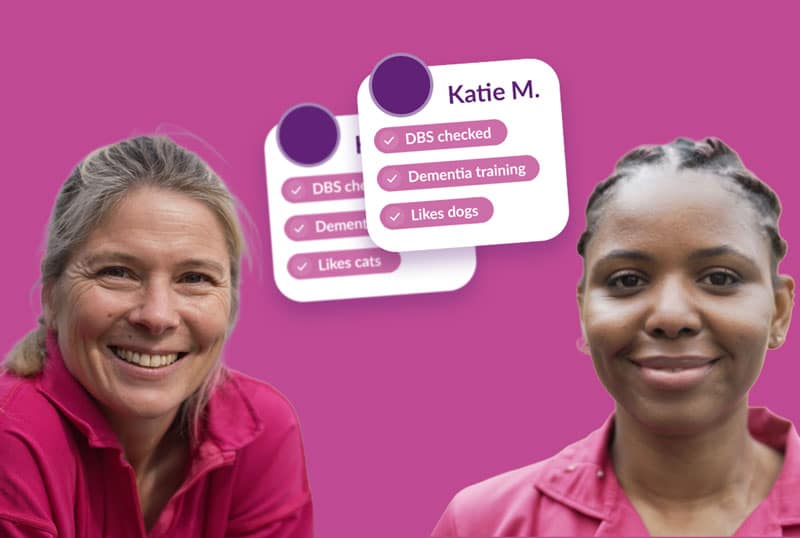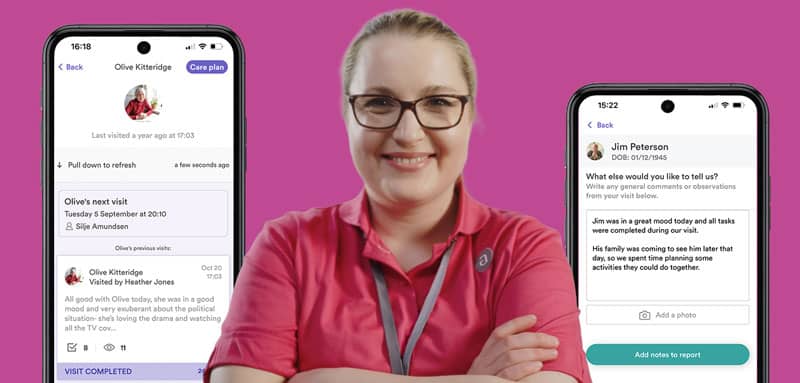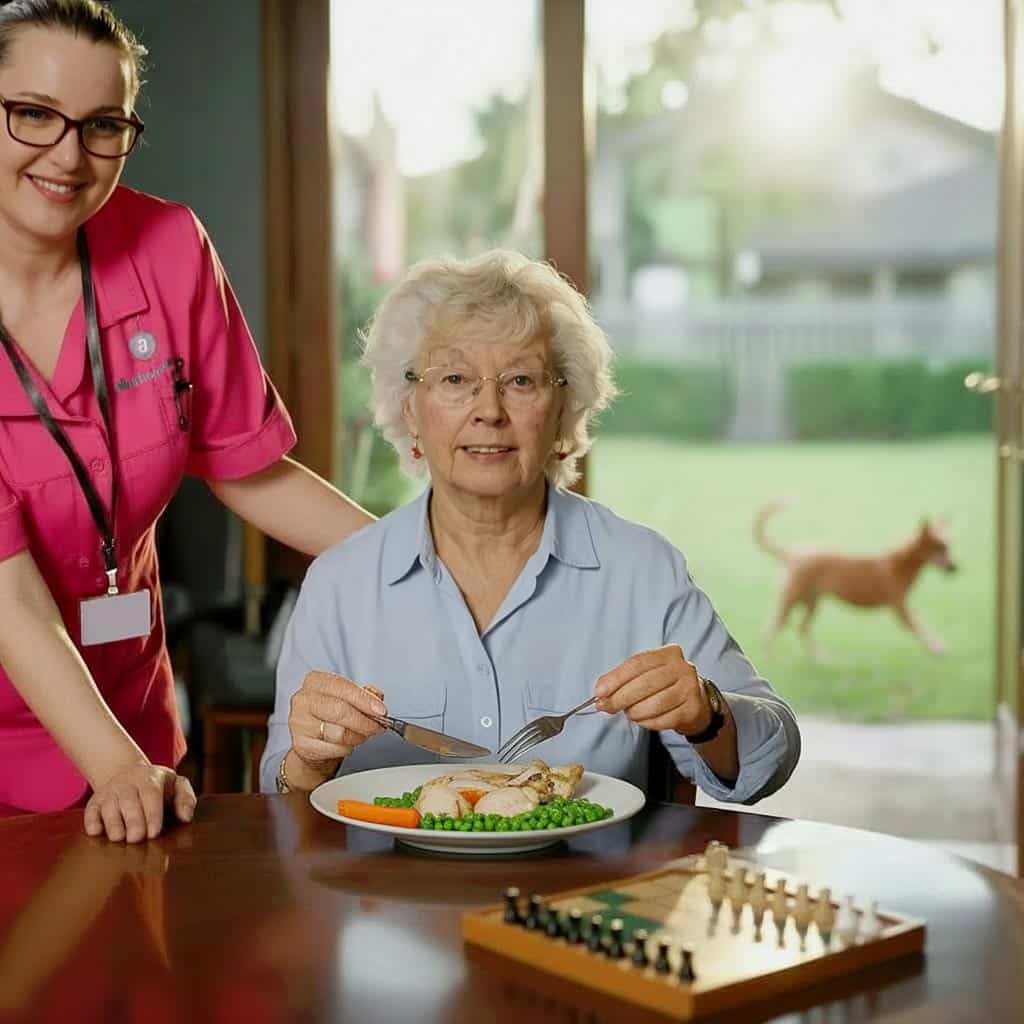Always here
when you need us
Our care offers conversation & companionship to combat loneliness through the winter months.






The quality of care you receive is directly affected by a care provider’s knowledge and their ability to help others. Our Teams receive exclusive training from our Alina Homecare Academy to meet our exacting standards, helping people stay independent in the comfort of their own home.

Having the same Carer or Carers is very important for people with cognitive decline. Our local Teams build relationships with you and your loved ones, supported by our central Live-in Team.

We make sure family members are part of care planning so that care is individualised to each person. Our approach includes companionship and practical support for the entire family.

Top 20 UK Home Care Group 2021-2025. Unlike private carers who may be untrained, all our Carers have full training, meet industry regulations and adhere to strict quality controls.

Click the photo to explore Live-in Care benefits…

Setting up routines can help people as they experience cognitive decline. Doing familiar things at the same time offers stability and reassurance. It also helps maintain a sense of normality.
Thanks to the regularity and proximity of a Live-in Carer, our Team can get to know what people need and therefore can help with activities of daily living. Home is where the heart is and with our Dementia Live-in Care service, it’s where your loved one can stay.
Spending time outside can do a lot of good for people who have dementia. It also helps with mobility. Live-in Care plans can include time outside every day, helping your loved one stay active and boosting their mood.
Having one to one time with a Live-in Carer makes these outdoor activities safer as your loved one has their undivided attention.
Many people with dementia move into a care home but the transition into residential care can come with sacrifice. It can often mean leaving behind a spouse or a treasured pet due to facility rules.
However, for people with dementia, relationships are especially important. Keeping close ties with your loved ones can help you feel connected to them. It can make people feel less alone and also helps people retain their own sense of self.
With Live-in Care, your loved ones can keep a pet and stay with their husband or wife. Our Live-in Carers can also provide pet care like a regular dog walks and veterinary appointments.
Nutrition is very important for people with dementia. It helps improve quality of life. A meal preparation plan can be made for each person to fit what they need to be healthy. This plan will also include what foods they like and dislike.
People with dementia will often forget to stock the fridge or eat breakfast, lunch and dinner. Of course, good nutrition helps maintain good health. A Live-in Carer can help maintain this routine with meal reminders to fuel the day.
| Live-in Care | Care Homes | |
|---|---|---|
| Care Approach | Personalised one on one care ratio | Group care, shared caregivers, often 10:1 ratio |
| Location | Individual’s own home | Residential care facility |
| Independence | High level of independence | Potentially less independence |
| Social Interaction | Caregivers can provide companionship | Socialisation with other residents |
| Flexibility | Flexible care schedule | Structured daily routine |
| Accommodation | Requires a spare room for caregiver | Accommodation provided |
| Amenities | Dependent on individual’s home | Dining rooms, gardens, activities |
| Respite Care | Easy to arrange | Limited availability |
| Quality of Care | Dedicated caregiver | Can vary by facility |
| Waiting Lists | No waiting list | Often have waiting lists |
| Personalisation | Tailored to individual needs | Less personalised |

What are the daily challenges and emotional impact?
Dementia affects daily functioning and decision-making, emotional wellbeing and mood, and safety awareness and independence. People with dementia go through many challenges as the condition gets worse.
A person with dementia may feel confused. They might sometimes forget things or not recognise people. Frontotemporal dementia and some other kinds may start with mild signs. You may notice forgetfulness at first. Later, things can get more confusing.
What are the emotional and practical challenges that families face?
Caring for someone with dementia can be very hard on families. It takes a lot of time and effort. There’s often worry about keeping the person safe. A family may feel stress, tiredness and sadness. Sometimes, it can feel like there’s no break.
Family members often change how they live to support others. They do this while also managing their own lives at the same time. This situation is hard for everyone who is part of it.
What difference can professional support make?
Live-in Care gives support and helps both the person getting care and their family members. When new care needs are identified, it’s good to get the right support services to help maintain quality of life.
The need for emotional support is very important. Live-in Caregivers can really change things. They give help all through the day, along with giving emotional support to those who need it. This way of caring helps the wellbeing of the whole family.



Live-in Care is when someone moves into your own home to help when your loved one needs it. The help they can provide is varied and specific to your requirements. It could be bathing, washing, getting dressed, meal preparation or cleaning. It could be more specialist like dementia support like preventing wandering at night. With Dementia Live-in Care, your loved one remains at home and things stay much the same while other aspects change. A Live-in Carer is there 24/7 with the opportunity to have a visiting Carer to cover breaks.
Yes, Live-in Care can help people during all the stages of dementia. This type of support changes to fit what each person needs as their situation changes. It always matches the needs at every stage of dementia and helps people stay safe and as independent as possible.
Live-in Care often helps make life easier. It deals with both the feelings and the physical changes that come with the different stages of dementia. It aims to improve or at least maintain quality of life at every step.
Our Live-in Caregivers have the right training and experience to give high quality care. They go through background checks to ensure they are safe and trusted. Each caregiver also gets training in first aid, safety and help with daily tasks. Many have care certificates or have worked in this field for some time. We always make sure our team gets specialist training where necessary so that they know the best ways to help in a specific situation. This gives you and your loved ones peace of mind knowing your loved one is in good hands.
Our Live-in Caregivers also undertake training in Dementia Care and they keep learning while working. Their professional certifications show they have real skills in this work. We show them the best ways to help by teaching them good support services methods.
We also help them learn ways to talk effectively with care recipients. This makes sure they can give the right support services that each person needs.
Live-in Care has many benefits for people with dementia. It lets them stay in their own home and feel safe. There is always a Carer with them, so they have help day and night. A familiar place can help with memory and bring comfort. The Carer can support them with daily tasks like eating, bathing and taking medicine. Family can feel at ease, knowing their loved one is not alone. Living at home also gives the person their privacy and lets them stay close to the people and things they care about. A regular daily routine makes life feel more normal for them. Live-in care offers kindness, time and care every day.
This type of care lets your loved one stay as independent as they can while also keeping them safe. It works to make life more manageable and helps improve the quality of life for family members.
The length of time that people with dementia can stay at home is different for each person. This can be because their specific needs are not the same. It also matters how much support they already receive. When someone has the right help for what they need and get some additional help, they can often live in familiar environments for a longer time. This can help people keep a good quality of life and stay home for a longer time.
Family members play a big part in helping a loved one receiving Live-in Care for dementia. Their love and support can make the person feel safe and happy. Family can also talk to the care team. This helps everyone know what the person needs and wants, especially if their dementia is advanced.
Family can also share details about the person’s life with the Carer. This can help the Carer understand what makes their loved one feel calm or happy. It’s helpful for family to listen to their loved one. Let them share stories or feelings when they want. Being patient is also important.
Family members should take care of their own needs too. If they feel rested and well, they can help their loved one better. They can ask for extra help when it is needed.
Dementia Live-in Care prices vary from provider to provider and can change based on the person’s specific needs and how much help they need. The place where you live, how much experience a Carer has and how long they are needed could all affect the cost.
At Alina Homecare, we’re committed to transparent and easy to understand pricing. We charge the same rates across all our areas for Live-in Care to give you a clear indication of what our care will cost. To find out more, contact your local Alina Homecare Team.
Yes, Dementia Live-in Caregivers can help people with all forms of dementia. This includes conditions like Alzheimer’s, Lewy body dementia, frontal lobe dementia and more. They know how to give care that fits each person’s needs.
A Live-in Caregiver can be in the home day and night, so your loved one is not alone. The caregiver can help with things like eating, bathing and other daily tasks. This kind of care is good for people in any stage. No matter what forms of dementia someone has, a Live-in Caregiver can give support and make life easier for them and for your family.
Assisted living is when your loved one moves to a facility made for people who need a bit of care but not all the time. In an assisted living facility, they’ll live in their own flat or room. People help with small things like medicine reminders or cleaning but your loved one is more independent. As people live together in one place, they share spaces like dining rooms and/or lounges.
This is good for people who want to be around other people or do group things but still have help close by if they need it.
This obviously varies from Live-in Care as your loved one leaves their own home, rather than someone moving in with them. Both care options are there to support with daily life. What you choose will depend on what you and your loved one feel is best and how much help is needed.
This can mean you may have less personal space or not have as much say over what you do each day. Both Live-in Care and an assisted living facility have their own good points. The best one for you depends on your own specific needs.
Dementia is a challenge for both the person diagnosed and their loved ones. Memory care facilities are made for people who have memory problems like dementia. People get special help there that they may not otherwise receive at home. These places have staff who know how to support people like this. They are trained for it. A memory care facility also keeps people safe. They are less likely to get lost. They get meals, medicine on time and care when they need it. In many cases, families feel some relief because they know help is there all the time. Memory care can give people with dementia a better, safer daily life.
Deciding if someone with dementia needs to go into memory care depends on what they need and where they are right now in life. Living at home with help is another way they can get care. With this choice, the person gets to stay in their house. They keep some control over what they do each day. They also get support services and people to keep them company through live-in care.
Yes, Live-in Care can help people during all the stages of dementia. This type of support changes to fit what each person needs as their situation changes. It always matches the needs at every stage of dementia and helps people stay safe and as independent as possible.
Live-in Care often helps make life easier. It deals with both the feelings and the physical changes that come with the different stages of dementia. It aims to improve or at least maintain quality of life at every step.
Our Live-in Caregivers have the right training and experience to give high quality care. They go through background checks to ensure they are safe and trusted. Each caregiver also gets training in first aid, safety and help with daily tasks. Many have care certificates or have worked in this field for some time. We always make sure our team gets specialist training where necessary so that they know the best ways to help in a specific situation. This gives you and your loved ones peace of mind knowing your loved one is in good hands.
Our Live-in Caregivers also undertake training in Dementia Care and they keep learning while working. Their professional certifications show they have real skills in this work. We show them the best ways to help by teaching them good support services methods.
We also help them learn ways to talk effectively with care recipients. This makes sure they can give the right support services that each person needs.
Our Live-in Caregivers are recruited and picked with a lot of care. We look at what the person needs the most. Several factors go into this choice and our Team will ask about your preferences, daily routines and stage of dementia.
Caregivers who already know how to care for people with dementia are a good match. They get paired with the person based on their skills and how well they might get along. This way, both feel comfortable. Over time, the same Live-in Care Team will learn a person’s likes and daily habits. The person with dementia will feel safe and understood and the care fits just what they need.
Live-in Caregivers help people with dementia by looking at their specific needs, what they like and how they act. This helps care providers choose the right person to help and give support. It makes people feel more at ease with who is with them.
Yes, dementia Live-in Caregivers get training to help people who have all types of dementia. They know how to care for those with Alzheimer’s disease, vascular dementia and frontotemporal dementia.
A Live-in Caregiver will help keep the person safe and feeling calm. They can help manage things like forgetfulness, angry outbursts or when the person gets lost or confused. Live-in Caregivers also help with the activities of daily living such as eating, taking medicine, getting dressed and using the bathroom.
A good caregiver understands what the person with dementia needs and does their best to make them feel comfortable and cared for.
